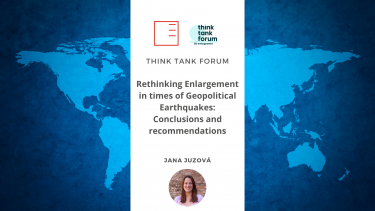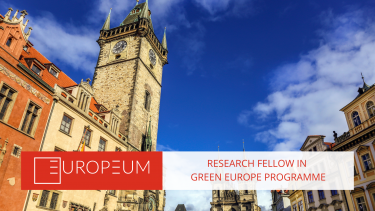Think Visegrad Fellowship offer: Call for proposals 2024
The Think Visegrad platform, which brings together think tanks from the Visegrad countries, including the EUROPEUM Institute for European Policy, is offering eight visiting fellowships to non-Visegrad expert fellows for the period Summer/Autumn/Winter of 2024. The duration of fellowships varies from 6 to 8 weeks (based on agreement with the hosting institute).
Show moreReport: Impact of the Russian war in Ukraine on European Security Architecture and EU’s Eastern Neighborhood
On October 25th, EUROPEUM’s Brussels Office under the representation of Think Visegrad Brussels and in cooperation with Fondation Robert Schuman organized an expert discussion titled “Impact of the Russian War in Ukraine on European Security Architecture and EU’s Eastern Neighborhood”. This discussion, which was held under the Chatham House rules, gathered 19 experts from think-tanks, EU institutions, NATO and diplomats from EU Member states.
Show more PDFReport: EVs, subsidies and the future of CEE industry
On October 24, EUROPEUM’s Brussels Office under the representation of Think Visegrad Brussels and in cooperation with OSW organized an expert discussion titled “EVs, subsidies and the future of CEE Industry”. This discussion gathered 16 experts from think-tanks, academia, and experts from the European institutions. This discussion was held under the Chatham House rules.
Show more PDFRevivEU
RevivEU project, carried out by four leading institutions in the V4 countries, looks at the needs, concerns and fears of the V4 citizens in four various EU-related topics. It does so through both quantitative and qualitative research of citizens´ attitudes towards climate change, migration, covid-19 and the rule of law. It also analyses the governmental policies in these four main areas and how the communication of these policies is framed in the public discourse.
Show moreAnalysis | Reinvigorating the EU enlargement policy: Phasing-in as a way to overcome the enlargement impasse
In this paper, Jana Juzová, together with Žiga Faktor and Constanza Celoria, are providing a comprehensive analysis of the proposals initiated by the think-tank community as well as the current initiatives and discussions at the EU level; they are identifying opportunities and areas where tangible progress can be achieved, and providing recommendations to policymakers on how to turn these concepts into reality in the foreseeable future.
Show more

Radiožurnál: Hungary without the Presidency? A slap in the face for Orbán and a sign of EU frustration with his policies, says expert
In the Bruselské chlebíčky podcast, the head of the Brussels office of the EUROPEUM think-tank comments on the situation with the upcoming European Presidency. The incoming Spanish presidency is currently open-ended, due to the upcoming Spanish elections, and the Hungarian presidency next year is one that MEPs would prefer to abolish altogether.
Show more
Think Visegrad Fellowship offer: Call for proposals 2023
The Think Visegrad platform, which brings together think tanks from the Visegrad countries, including the EUROPEUM Institute for European Policy, is offering eight visiting fellowships to non-Visegrad expert fellows for the period Autumn/Winter of 2023. The duration of fellowships varies from 6 to 8 weeks (based on agreement with the hosting institute).
Show moreRoundtable report | Monitoring of the EU’s Green Policies: Perceptions and Narratives in the Czech and Slovak Information Space
On 17th of January 2023, the EUROPEUM Institute for European Policy organised a closed roundtable discussion titled Monitoring of the EU’s Green Policies: Perceptions and Narratives in the Czech and Slovak Information Space. The discussion was held under the Chatham House Rule and attended by experts on the EU’s green policies and disinformation from think-tank communities and academia as well as by journalists who regularly comment on these topics. The event was moderated by Žiga Faktor, EUROPEUM’s Head of the Brussels Office. A short report from the discussion was prepared by our junior researcher and project manager Tatiana Mindeková.
Show moreThink Tank Forum | Rethinking Enlargement in times of Geopolitical Earthquakes: Conclusions and recommendations
This policy brief summarizes the conclusions of the EU Enlargement Think-Tank Forum “Rethinking Enlargement in times of Geopolitical Earthquakes” organized in cooperation with Heinrich Böll Stiftung Prague Office and other partners.
Show moreJob Offer: Research Fellow in Green Europe Programme
EUROPEUM Institute for European Policy is looking for a Research Fellow in Green Europe Programme. For more information, including requirements, please see the attached PDF.
Show more PDFStaroměstské náměstí 4/1
Prague 1 - Staré Město
110 00
tel.: +420 212 246 552
email: europeum@europeum.org
https://www.europeum.org









